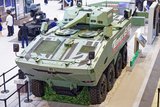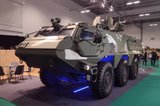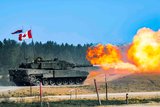Rheinmetall's LGST, DST systems complete acceptance tests
Rheinmetall's Leopard Gunnery Skills Trainer (LGST) and Driver Training Simulator (DTS) systems have completed factory acceptance tests with the Indonesian Army, the company announced on 22 April.
The completion of acceptance tests comes 15 months after Rheinmetall was awarded the contract worth several million euros to provide driving simulator and gunnery simulator systems for Indonesia's Leopard 2 tanks.
The company developed the LGST and DTS specifically for training Leopard 2A4 tank crews. The simulators also feature Rheinmetall's TacSi technology. These systems will primary target the gunnery and combat skills of commanders, gunners and drivers.
With the success of the acceptance tests, the delivery and installation of the simulators will begin shortly to complete the project on schedule.
Related Equipment in Defence Insight
More from Land Warfare
-
![US DoD task force’s DroneHunter acquisition lays groundwork for Replicator 2 CUAS strategy]()
US DoD task force’s DroneHunter acquisition lays groundwork for Replicator 2 CUAS strategy
As the US Department of Defense looks to counter the growing threat of uncrewed aerial systems to improve homeland security, the DroneHunter acquisition could point to future commercial innovation.
-
![Norway opts for Hanwha’s Chunmoo for long-range fires under $2 billion deal]()
Norway opts for Hanwha’s Chunmoo for long-range fires under $2 billion deal
The selection of Hanwha’s K239 Chunmoo long-range precision fires system, with a contract expected to be signed on 30 January, makes Norway the second European country to choose the system. It is expected an operational system will be in service within four years.
-
![Canada looking to expedite purchase of armoured fighting vehicle and a new tank]()
Canada looking to expedite purchase of armoured fighting vehicle and a new tank
Canada is improving its Leopard main battle tank fleet but before this is fully completed, it is expected to begin looking for new vehicles.























